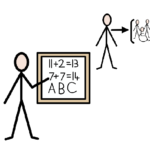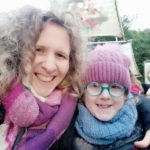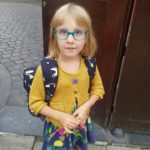Click on a word which is in blue and bold to read what it means.


“On souffle dans ton dos” is an NGO in Belgium.
“On souffle dans ton dos” means “We blow in your back”.
The NGO helps children with disabilities to
be included in mainstream school.

Christine Dufour is the founder of the NGO.
She has a daughter with intellectual disabilities.
Her name is Lisette.

Inclusion Europe did an interview with Christine Dufour.
She spoke about how inclusive education is good for everyone.

How was the NGO founded?
The creation of the NGO was needed
when I realized that Lisette needed help in the classroom.
Lisette has been attending mainstream school
since the age of 3.

But I realised that it was essential to
put in place something that could help her in her learning.
Then, I looked for someone who wanted to help Lisette
understand the instructions, and
adapt teaching materials to her needs.
A volunteer agreed to help my daughter in her classroom.
This was a real help for Lisette and her teacher.

That is how I came up with the idea of creating the NGO
to help other children with disabilities to be included at school.

What does your NGO do?
The NGO sets up individual support within mainstream schools.
A volunteer helps a child with disabilities in the class and
becomes a support for the child and the teacher.
To this date, the NGO has about 60 volunteers,
who help about 60 children with disabilities.

Do you have any future projects?
We have the project to create an inclusive school.
This school would welcome:
- children with disabilities,
- children without disabilities.

Teachers would
- use new teaching methods,
- be trained to supervise any child with complex support needs.

What are the benefits of inclusive education?
Inclusion of children with disabilities is good for everyone.
Children with support needs are pushed to do better.
Their inclusion in the class brings tolerance and empathy.
It is also a benefit for the teachers.
They are encouraged to adapt their learning methods
to the needs of every child.

How does Lisette experience her inclusion in mainstream school?
Being included at school helps Lisette understand
the behaviours that are good
and the behaviours that are not.
She starts reading, and
she loves mathematics.
She is interested in many things.
Inclusive education plays a big role in all of this!

Her inclusion at school is good for her
but also, for the other children.
The children develop a sense of mutual aid,
and the teacher does not have to impose it!

What needs to be done for schools to be truly inclusive?
Schools must have enough
money and people to help
implementing inclusion in classrooms.
The school system must also adapt
to the needs of each child,
not the other way around!





